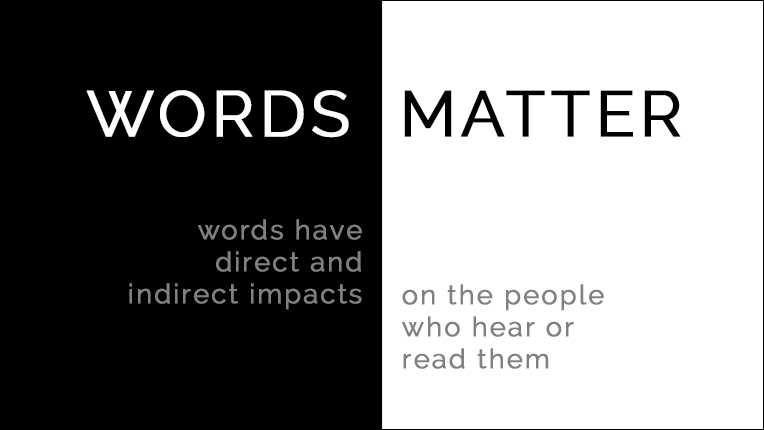Indigenous Peoples Heritage Month
“Preserving Cultural Data and Language Sovereignty while also Benefiting from Emerging Technologies in the AI Era: Challenges and Opportunities”
Date: November 6th, 2024
Time: 5 PM to 6 PM ET
In celebration of Indigenous Peoples' Heritage Awareness Month, the ACM DEI Council hosted a panel for our diverse computing community that provided interesting and insightful perspectives on issues of great importance, particularly to persons from indigenous populations. Organized by ACM DEI Council member, Timothy Pinkston (University of Southern California), the panel consisted of indigenous researchers from multiple countries who discussed why data sovereignty and the preservation of native cultures and languages are important and why these may be at risk with Generative AI and other emerging technologies; how the creativity and ingenuity inherent to indigenous cultures can be cultivated by leveraging computing and other advanced technologies; how further to improve access to computing technologies and related research/education resources in tribal communities, while also enabling environmental and wildlife sustainability, advancing native culture and way of life; and much more.
Moderated by Cynthia (Star Horse Woman) Lindquist, other panelists included Ian Her Many Horses, Te Taka Keegan, Sean Chandler, and Elmer Guy.
Moderator
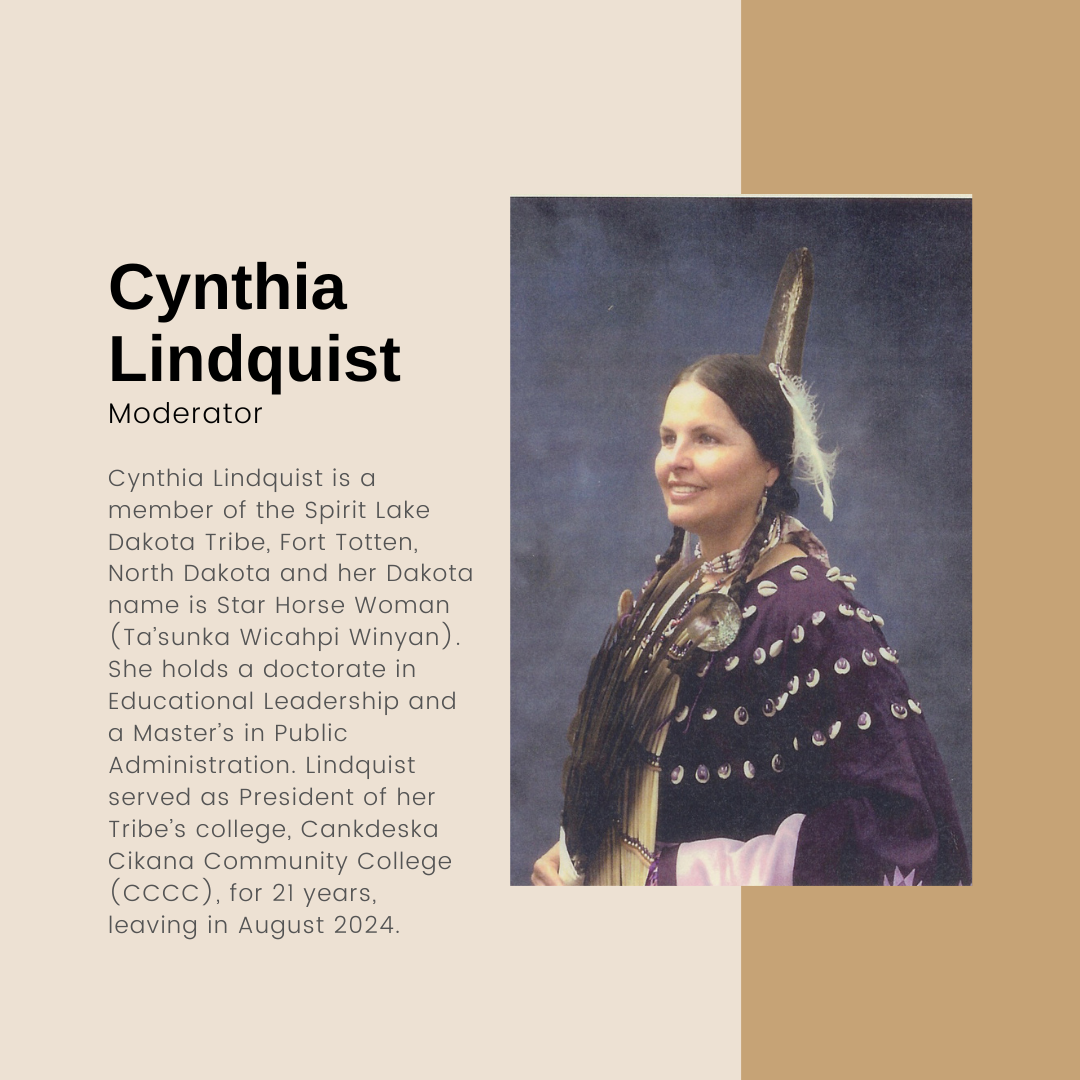
Dr. Cynthia Lindquist is a member of the Spirit Lake Dakota Tribe, Fort Totten, North Dakota and her Dakota name is Star Horse Woman (Ta’sunka Wicahpi Winyan). She holds a doctorate in Educational Leadership and a Master’s in Public Administration. Dr Lindquist served as President of her Tribe’s college, Cankdeska Cikana Community College (CCCC), for 21 years, leaving in August 2024. Under Dr Lindquist’s leadership CCCCs physical campus quadrupled, they had 20 years of clean audits, and most importantly, student enrollment and completion rates more than doubled. CCCC took over the management of the Tribe’s Head Program in 2014 and with Dr Lindquist’s leadership, a new CCCC Head Start facility was completed in the fall 2018 that serves over 175 Native children and families. Dr Lindquist was the lead grant writer for a $14 million award for the five North Dakota tribal colleges to implement registered apprenticeships for tribal employment. Among her key leadership roles, she is a founding member of the National Indian Women’s Health Resource Center, a Bush Foundation Leadership Fellow, serves on the North Dakota Ethics Commission, and is a member of the U.S. National Science Foundation Committee on Equal Opportunity in Science and Engineering.
Panelists
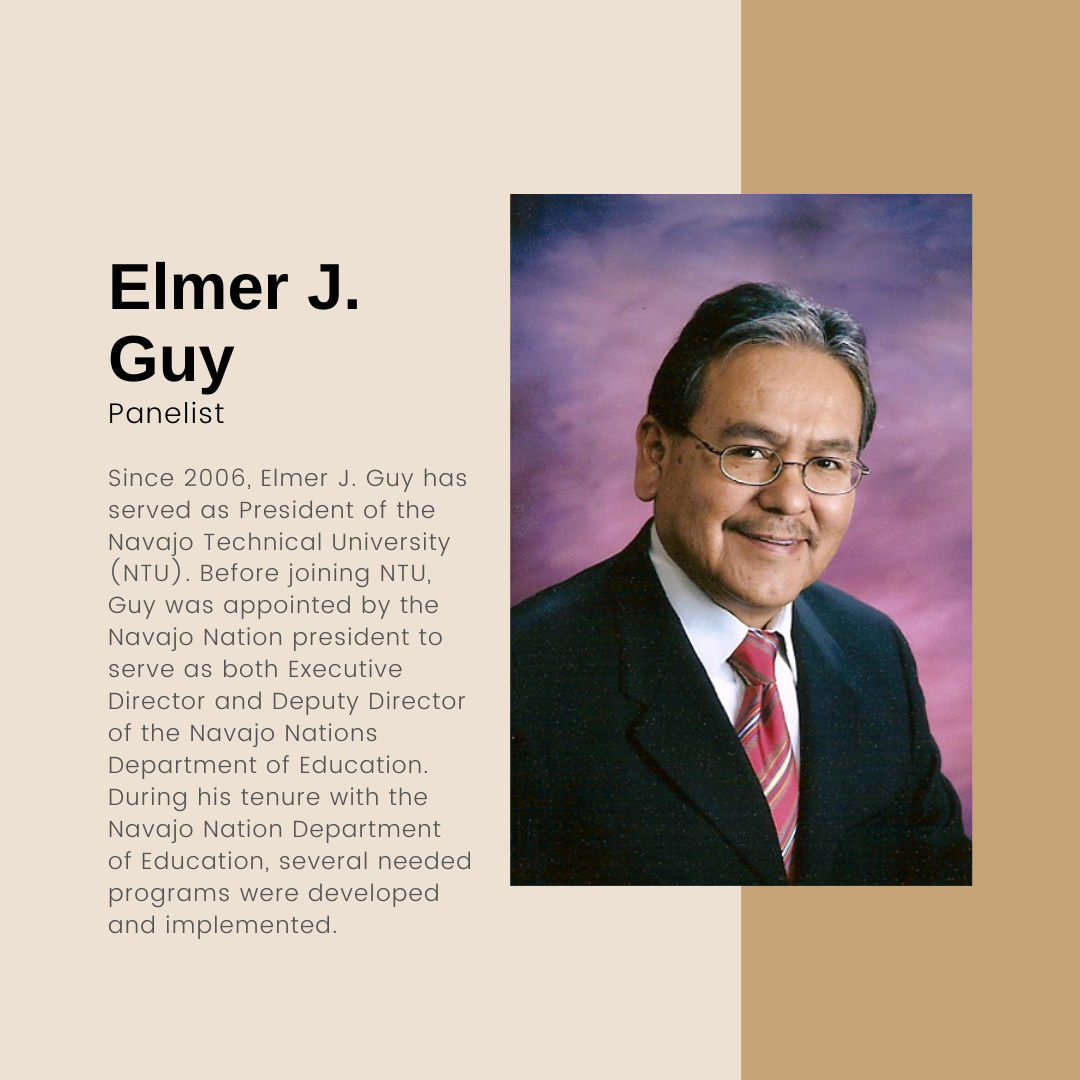
Since 2006, Dr. Elmer J. Guy has served as President of the Navajo Technical University (NTU), a member of the American Indian Higher Education Consortium (AIHEC) which is a community of 38 tribally and federally chartered U.S. institutions of higher education. Before joining NTU, Dr. Guy was appointed by the Navajo Nation president to serve as both Executive Director and Deputy Director of the Navajo Nations Department of Education. During his tenure with the Navajo Nation Department of Education, several needed programs were developed and implemented, including two trusts for the persons with disabilities ($7 million) and for a vocational education program ($6 million) and a comprehensive teacher education program, all of which remain in full operation. Dr. Guy also directed the Office of Special Education and Rehabilitation Services for the Navajo Nation. Dr. Guy serves as Chair of AIHEC, Co-chair of the World Indigenous Higher Education Consortium, and former Trustee of the U.S. College Board. He also was appointed by President Joe Biden to serve on the National Board of Education Sciences. Dr. Guy earned his Bachelor’s and Ph.D. degrees from the University of Arizona, and his Master’s degree from the University of San Francisco.
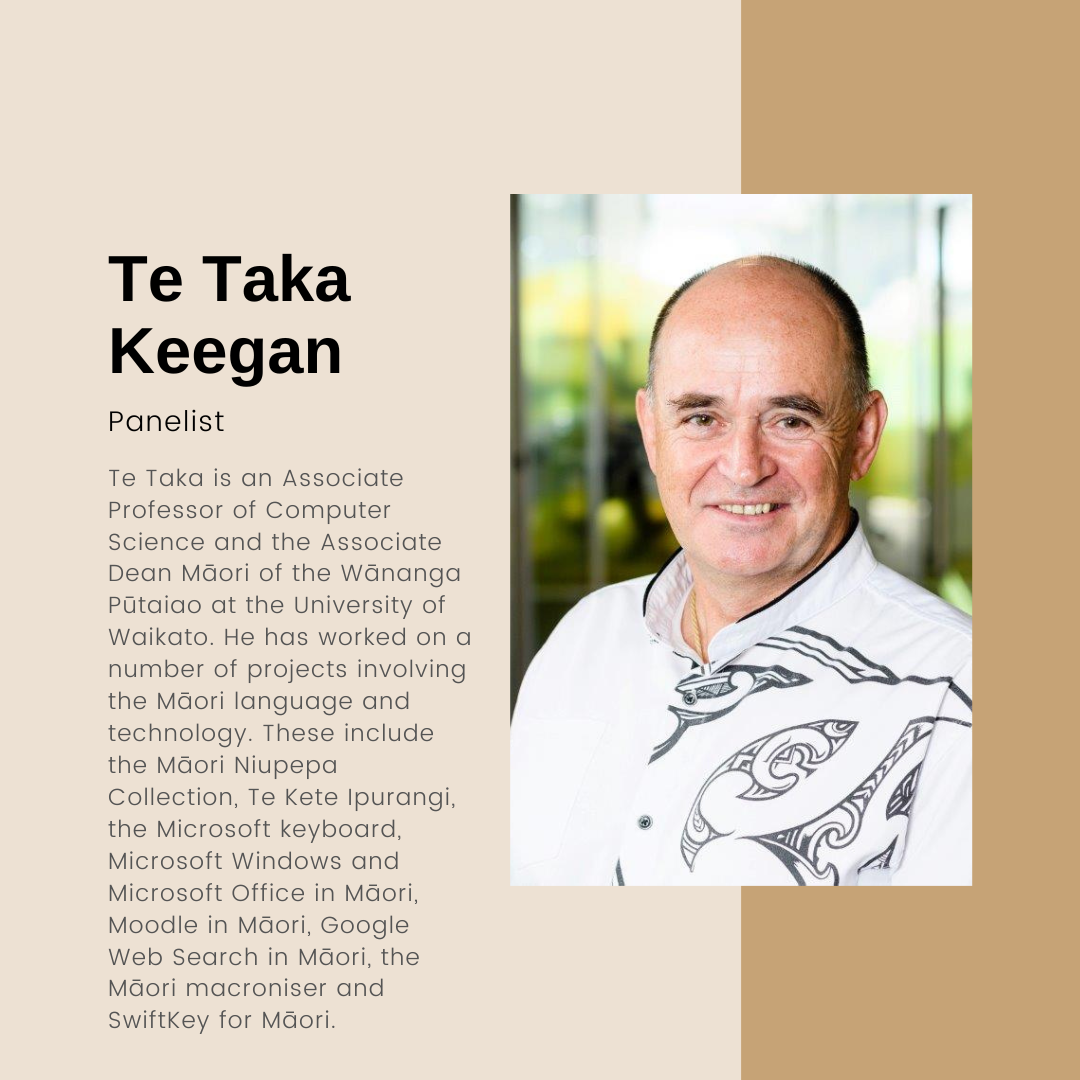
Te Taka Keegan is from Waikato-Maniapoto, Ngāti Porou and Ngāti Whakaue. He is an Associate Professor of Computer Science and the Associate Dean Māori of the Wānanga Pūtaiao at the University of Waikato. Te Taka received a Diploma in Computer Engineering from CIT (Wellington) in 1987, a BA through the Te Tohu Paetahi stream (Māori immersion), a MA in 1996, and completed a PhD in 2007. He spent six years working as a hardware engineer for Datacom and Digital before returning to the Waikato and Waikato University. Te Taka worked with the Māori Department and then in 1997 switched to the Computer Science Department. Te Taka has worked on a number of projects involving the Māori language and technology. These include the Māori Niupepa Collection, Te Kete Ipurangi, the Microsoft keyboard, Microsoft Windows and Microsoft Office in Māori, Moodle in Māori, Google Web Search in Māori, the Māori macroniser and SwiftKey for Māori. In 2009, Te Taka spent 6 months with Google in Mountain View as a visiting scientist assisting with the Google Translator Toolkit for Māori. Further work with Google led to Translate in Māori.
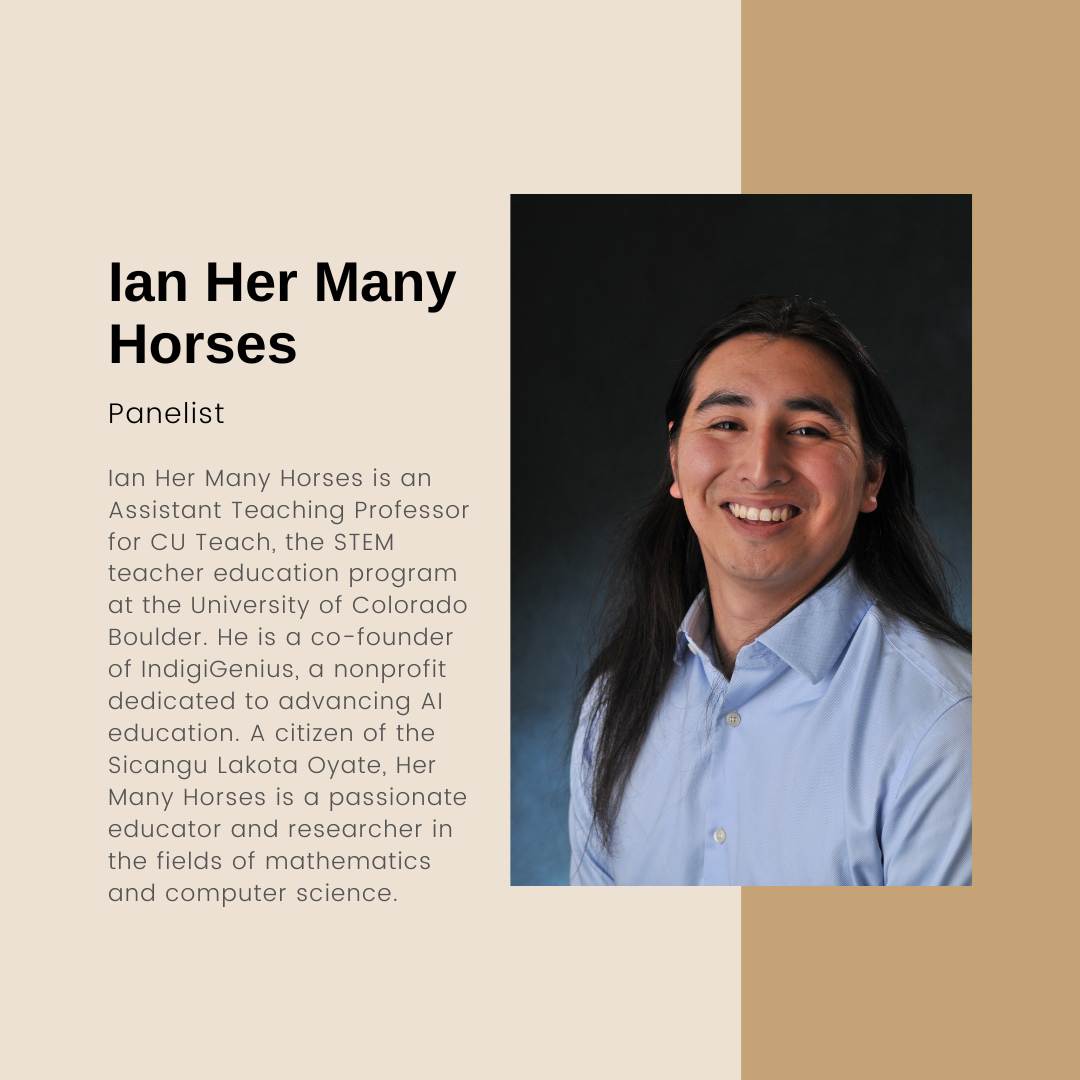
Dr. Ian Her Many Horses is an Assistant Teaching Professor for CU Teach, the STEM teacher education program at the University of Colorado Boulder. He is a co-founder of IndigiGenius, a nonprofit dedicated to advancing AI education. A citizen of the Sicangu Lakota Oyate, Dr. Her Many Horses is a passionate educator and researcher in the fields of mathematics and computer science. His work centers on creating equitable access to, and meaningful learning experiences within, computer science across the K-12 schooling system. This has included developing and implementing curricula, software tools to support novice learners, and professional development for practicing teachers in schools that are not readily able to access and offer computer science learning experiences. He holds a B.S. in Computer Science ('06) and a Ph.D. in Computer Science Education ('16) from the University of Colorado Boulder.
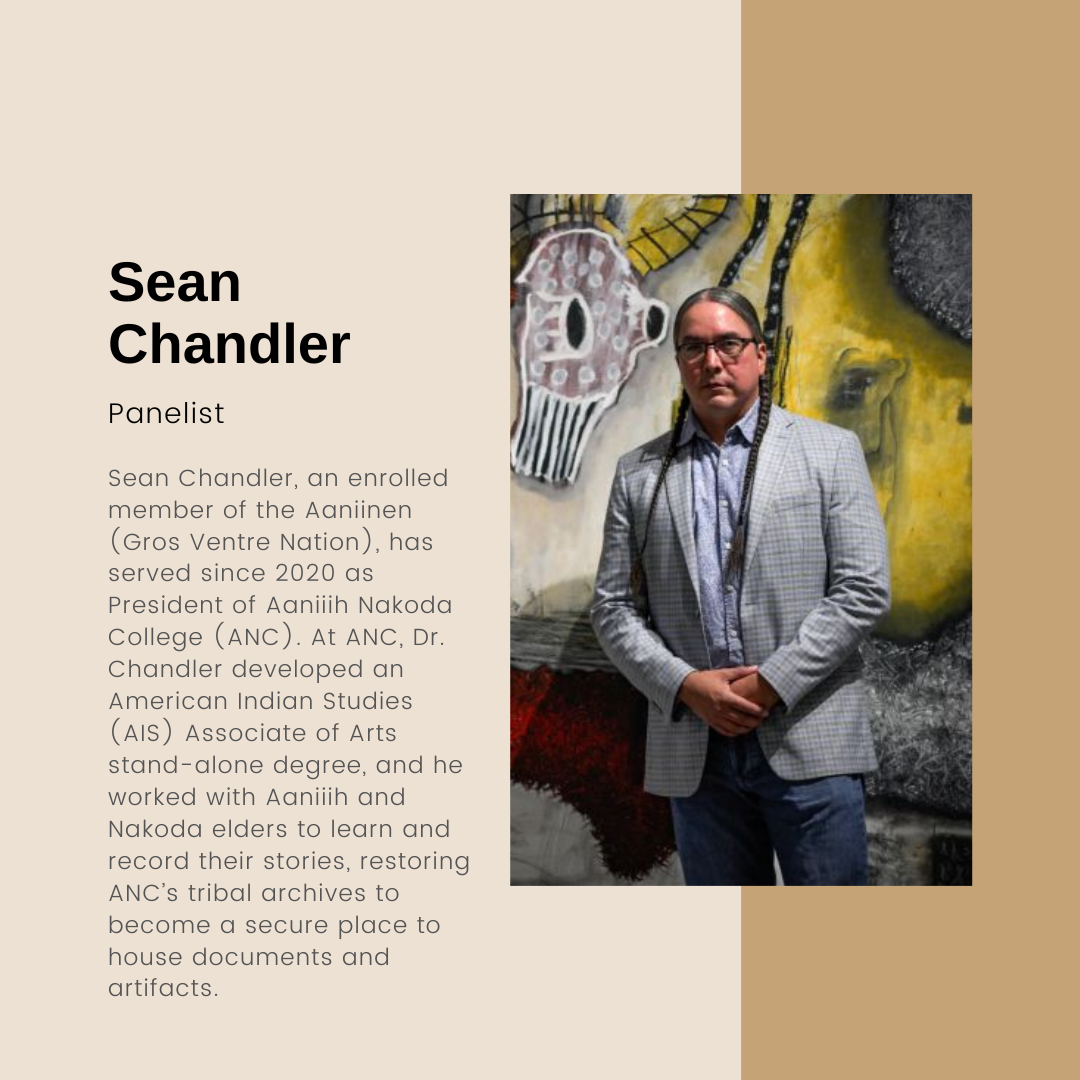
Dr. Sean Chandler, an enrolled member of the Aaniinen (Gros Ventre Nation), has served since 2020 as President of Aaniiih Nakoda College (ANC). At ANC, Dr. Chandler developed an American Indian Studies (AIS) Associate of Arts stand-alone degree, and he worked with Aaniiih and Nakoda elders to learn and record their stories, restoring ANC’s tribal archives to become a secure place to house documents and artifacts. Dr. Chandler played a major role in contributing to the identity of ANC in terms of developing the foundation of all degree programs as well as the physical look of the campus to reflect the Lifeways of the Aaniiih and Nakoda People. He is a nationally known artist, starting at an early age when his father taught him the traditional arts of his ancestors, including hide and tipi painting. His artwork has been acquired by private collectors and museum collections such as the Minneapolis Institute of Art, Yellowstone Art Museum, and the Missoula Art Museum. Most recently, Sean was selected as one of five artists for the 2023 Eiteljorg Contemporary Art Fellowship of the Eiteljorg Museum. In 2022, he was appointed to the National Assembly of State Arts Agencies, an agency that advocates for all state arts agencies, and he is also a Community Voice on the National Folklife Network, an initiative to build the capacity of cultural heritage organizations and strengthen folk and traditional arts infrastructure.
For Indigenous Peoples Heritage Month recommended readings:
- The Heartbeat of Wounded Knee, David Treuer (2018)
- Indian Givers, Jack Weatherford (1988)
- Native Science: Natural Laws of Interdependence, Greg Cajete (2000)
- Ignite the Sparkle: An Indigenous Science Education Curriculum Model, Greg Cajete (1999)
- Ancient Wisdom, Modern Science, Edited by Paul Boyer (2010)
Awareness Months Archive
Embracing diverse perspectives, backgrounds, and experiences enrich the ACM community and strengthen ACM's ability to support the global computing community. Awareness months are a time dedicated to reflection, education, and engagement to understand and embrace the diverse membership within the ACM community. Our archive display the past and current celebrations ACM have created to foster an inclusive and equitable environment for all within the computing community.
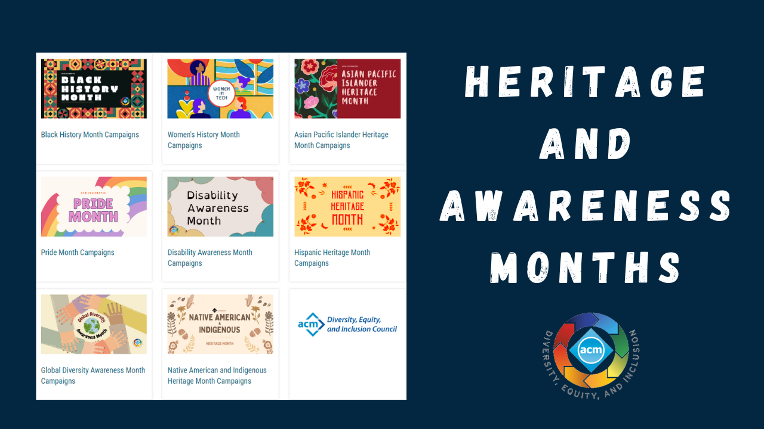
How Diverse Is Your Team?
ACM's Diversity, Equity, and Inclusion Council is an essential resource for SIGs, conferences, boards, and councils looking for best practices to improve diversity in their organization and develop programs with a broader reach in the computing community. Our guide provides examples of both inherent and acquired characteristics, which should be taken into consideration when looking at ways to improve the diversity of your team.

Words Matter
As part of ACM’s efforts to combat exclusion in the computing profession, ACM's Diversity, Equity, and Inclusion Council has launched an effort to replace offensive or exclusionary terminology in the computing field. They have developed a list of computing terms to be avoided in professional writing and presentations and offer alternative language. The Council plans to expand this list in the future and invites the community to submit suggestions for consideration.
